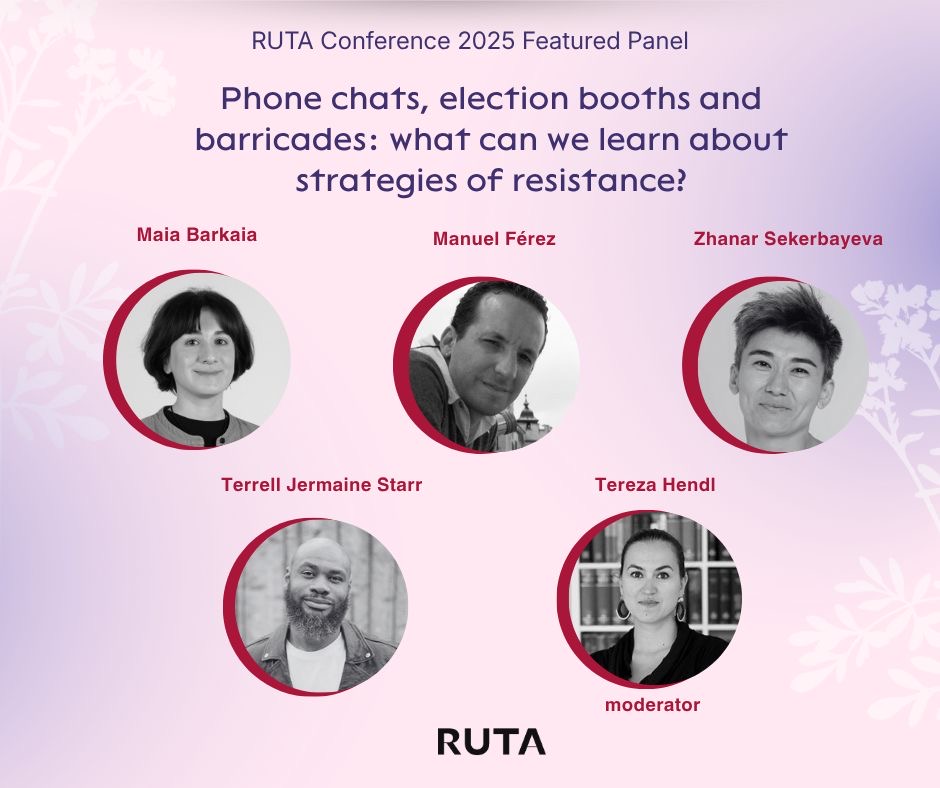The Second “Featured panel Phone chats, election booths and barricades: what can we learn about strategies of resistance?”
While the world is shattered in so many places, active dissent and resistance movements are simultaneously emerging in all its corners. What lessons can we draw from these movements from the perspectives of those who monitor, analyze and participate in them? From protests against Russian interference and occupation in Sakartvelo-Georgia, to queer feminist decolonial movements in Qazaqstan, the strengthening alliances between Russian imperialism and the American Far Right, and the dissonances between decolonial debates and praxis in Ukraine and Latin America, how should we approach the local and global dimensions of civil resistance movements, their broader socio-political implications, intersections and tensions? What are some effective approaches to speaking across divides and connecting different liberation struggles in ways that will build more widely supportive communities and solidarities? How can we communicate and share our knowledge in a manner that will not only support dialogues and mutual learning, but also the implementation of justice in the RUTA region(s) and across the world?
Speakers: Maia Barkaia, Manuel Férez, Zhanar Sekerbayeva, Terrell Jermaine Starr
Moderator: Tereza Hendl
Biographies
Maia Barkaia is an associate professor at the Georgian Institute of Public Affairs (GIPA). She holds a B.A. in Oriental Studies, an M.A. in Modern Indian History, and a Ph.D. in Gender Studies. These academic backgrounds have shaped her research and teaching interests, which center on Postcolonial and Gender Studies. Her work explores themes such as Imperial Entanglements, Modernity, and Inequalities in the Caucasus and Asia during the 19th and 20th centuries. She is also the co-editor with Alisse Waterston of Gender in Georgia: Feminist Perspectives on Culture, Nation, and History in the South Caucasus, published by Berghahn Books (2017, 2021).
Manuel Férez is a doctoral researcher at the University Alberto Hurtado in Santiago de Chile and has taught classes and courses on the Middle East and the Caucasus at various universities in Mexico and Chile. His academic research focuses on ethnic, linguistic and religious minorities in the Middle East, Caucasus and Europe, specifically their processes of memory and intergenerational identity transmission. Previously, he coordinated the Jean Monnet Chair in European studies at the International University of Cuernavaca, Mexico.
Zhanar Sekerbayeva is one of the co-founders of the Kazakhstan Feminist Initiative ‘Feminita’. She is a fierce lesbian, feminist, powerlifter and poet. Zhanar graduated with Summa Cum Laude from the ‘Gumilev’ Eurasian National University in 2005. In 2014 Zhanar enrolled at the European Humanities University (Lithuania) MA program in Sociology with focus on gender and culture, and finished at the University of Tsukuba, Japan, PhD program in 2020 (research was dedicated to trans community in Kazakhstan and state policies shaping trans identities and bodies). Recently organized and successfully had The First Lesbian Quryltai in Central Asia. Zhanar was recently arrested for 10 days for 1-year old protest against femicide in Kazakhstan on May 13, 2024. Her arrest was political – the government tried to isolate activist before 8th of March, International Women’s Day.
Terrell Jermaine Starr is an independent journalist based in Ukraine whose work helps non-experts understand world politics and why we should care. His expertise focuses on Ukraine and Eastern European politics, as well as communicating foreign policy issues in accessible ways.
Moderator: Tereza Hendl is a political philosopher, specialised in concerns of global health justice. She investigates concerns of oppression, vulnerability, refusal, empowerment, justice, and solidarity, and the ethics and epistemology of health technologies and interventions. Much of her research interrogates the impact of racialisation and white (western) supremacy, and the intersections of structural racism and sexism. Some of her latest work explores persistent hierarchies of knowledge as well as European East-West inequalities and their effects on health and wellbeing, also accounting for the impact of the intertwined and ongoing legacies of Russian and German imperialism, extractivism and coloniality. She is the founder of the CEE Feminist Research Network and co-founder of the RUTA Association for Central, South-Eastern, and Eastern European, Baltic, Caucasus, Central and Northern Asian Studies in Global Conversation. These initiatives amplify and interconnect so far epistemically marginalised knowledges and contribute to epistemic reparations.
